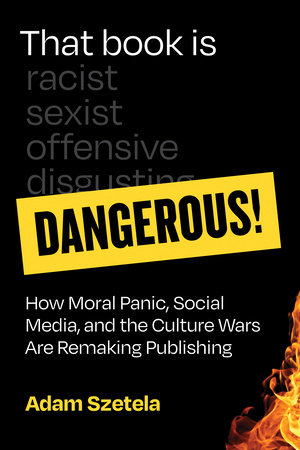Praise for That Book Is Dangerous!
"English literature PhD Szetela’s cutting debut reveals how progressives’ moral panic has created a chilling effect throughout the publishing industry....the author offers incisive analysis, such as pinpointing how there is an 'inattention to class differences' inherent in these literary debates...the book’s most illuminating contribution is Szetela’s collation of dozens of anonymous interviews with publishing insiders."
—Publishers Weekly
"Szetela explores the effects of left-wing identity politics on the publishing industry, focusing on the progressive activists targeting some children’s and young adult books for being offensive in terms of race, gender, and other matters. The result can be harassment of authors, cancellation of their books, and even loss of future work. Szetela compares criticism from the left with right-wing censorship efforts in their impacts on literary freedom. He traces the extent and techniques of the censorship and analyzes common avenues for mitigation, including the use of sensitivity readers and requiring that authors write only from their own experience. Using anonymous interviews with publishers, writers, sensitivity readers, librarians, and agents as well as theorists and studies, he explores whether censorship from the left is a moral panic and argues that adult anxieties play a role in restricting the content of children’s literature. Additionally, Szetela comments on the lack of attention to social class in publishing’s identity politics and offers a criticism of university culture, which he feels has enabled left-wing censorship. A sometimes-scathing commentary on the state of the publishing industry and identity politics, for readers worried about literary freedom."
—Library Journal
“Adam Szetela’s book is an indispensable investigation of the self-censorship happening behind closed doors inside publishers, literary agencies, and other institutions that have traditionally supported robust free speech. Even for those of us who have followed these developments with concern, his book reveals important new details and is illuminated by fascinating interdisciplinary analysis spanning the fields of law, sociology, moral philosophy, social psychology, political science, economics, and history. Szetela’s own book is itself dangerous—to the modern-day book burners who want to restrict the scope of what can be written and read.”
—Nadine Strossen, John Marshall Harlan II Professor of Law Emerita, New York Law School; former President, American Civil Liberties Union; author of HATE
“Szetela engagingly shows that censorship, thought-policing, and the punishment of heretics need not arise from autocratic governments or established religions. They can emerge in private organizations within a liberal democracy—organizations, ironically, whose mission would seem to be the free expression of ideas. This book should mobilize lovers of literate culture with common sense to push back on this madness. And it reminds us that censoriousness may be a part of human nature, and eternal vigilance the price of free speech.”
—Steven Pinker, Johnstone Professor of Psychology, Harvard University; author of Rationality
“If you believe in literature and wish it to have a future, read this brilliant book. Szetela offers a sobering snapshot of our censorial moment and both suggests and partakes in the courage required to undo it.”
—Junot Díaz, winner of the Pulitzer Prize for Fiction; author of The Brief Wondrous Life of Oscar Wao
“This brilliant book by Adam Szetela shows us how to make sense of the profoundly destructive and illiberal culture that passes for progressivism today. He not only describes in some detail how literary production is being suppressed in the name of social sensitivity but also how the entire enterprise reflects the interests and strategies of emergent elites. If there are more books like this one, we might just manage to crawl out of the wreckage.”
—Vivek Chibber, Professor of Sociology, New York University; author of The Class Matrix
“Adam Szetela’s well-researched, gutsy, insightful provocation bears eloquent witness to the concern of fellow progressives over the censorship of books in the name of progressive values.”
—Donald E. Pease, Professor of English, Dartmouth College; author of Theodor Geisel
"Adam Szetela has written an absorbing account of the moral panic that incited a rebirth of censorship in the 21st century. No other history covers the field so broadly, from writing programs to professional journalism, from young adult fiction to New Yorker contracts. His scholarship may help us to avert a second generation of trigger warnings, sensitivity readers, and morality clauses."
—David Bromwich, Sterling Professor of English, Yale University; author of Politics by Other Means
“Compelling, illuminating, and engaging, Dangerous vividly documents the harms that arise absurdly from efforts to censor books and denounce authors, harms that must be resisted by each generation as citizens in a civilized society try to beat back, yet again, the endless presence of scolds and crusaders who would have the temerity to restrict what others can write or even read. The many examples in Dangerous are so baroque, and the fear within the publishing industry so apparent, that reading this book makes one shake one’s head in dismay. Yet, shining bright light on this problem may itself help us to resist it and to do better—which we can.”
—Nicholas A. Christakis, Sterling Professor of Social and Natural Science, Yale University; author of Blueprint



